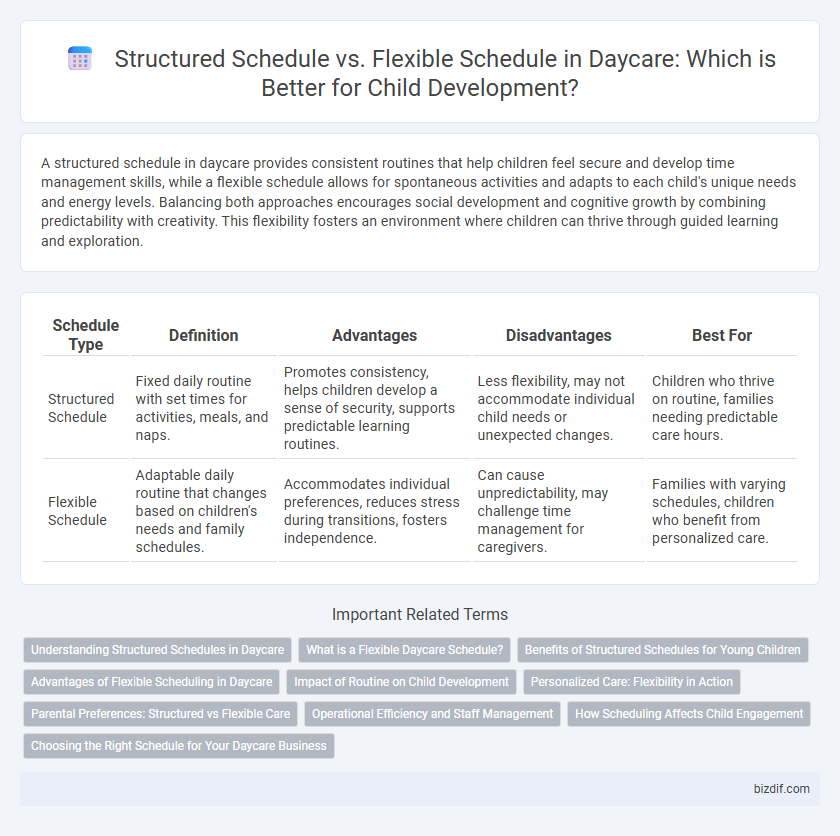A structured schedule in daycare provides consistent routines that help children feel secure and develop time management skills, while a flexible schedule allows for spontaneous activities and adapts to each child's unique needs and energy levels. Balancing both approaches encourages social development and cognitive growth by combining predictability with creativity. This flexibility fosters an environment where children can thrive through guided learning and exploration.
Table of Comparison
| Schedule Type | Definition | Advantages | Disadvantages | Best For |
|---|---|---|---|---|
| Structured Schedule | Fixed daily routine with set times for activities, meals, and naps. | Promotes consistency, helps children develop a sense of security, supports predictable learning routines. | Less flexibility, may not accommodate individual child needs or unexpected changes. | Children who thrive on routine, families needing predictable care hours. |
| Flexible Schedule | Adaptable daily routine that changes based on children's needs and family schedules. | Accommodates individual preferences, reduces stress during transitions, fosters independence. | Can cause unpredictability, may challenge time management for caregivers. | Families with varying schedules, children who benefit from personalized care. |
Understanding Structured Schedules in Daycare
Structured schedules in daycare provide consistent routines that support children's cognitive and emotional development by offering predictable meal, nap, and activity times. These schedules promote security and discipline, helping young children adapt to group settings and build time management skills early on. Research indicates that structured routines in early childhood settings correlate with improved behavior regulation and readiness for school.
What is a Flexible Daycare Schedule?
A flexible daycare schedule allows parents to adjust drop-off and pick-up times based on their needs, accommodating varying work hours and unexpected changes. This approach emphasizes individualized care routines that adapt to each child's energy levels and developmental pace, promoting comfort and well-being. Flexible schedules often support part-time attendance, extended hours, and personalized meal and nap times, enhancing convenience for families with dynamic lifestyles.
Benefits of Structured Schedules for Young Children
Structured schedules in daycare promote consistency, helping young children develop a sense of security and predictability essential for emotional stability. Regular routines enhance cognitive development by fostering better attention spans and time management skills. Predictable activities also support social interactions and healthy habits, leading to improved overall well-being in early childhood.
Advantages of Flexible Scheduling in Daycare
Flexible scheduling in daycare allows personalized routines that adapt to each child's unique needs and family dynamics, promoting better emotional well-being and developmental outcomes. This approach supports varied nap times, meal schedules, and activity transitions, enhancing comfort and reducing stress for children. Caregivers can more easily accommodate working parents' unpredictable hours, increasing accessibility and parental satisfaction.
Impact of Routine on Child Development
A structured schedule in daycare provides consistent routine that enhances children's sense of security, promotes emotional stability, and supports cognitive development by establishing clear expectations. In contrast, a flexible schedule allows adaptation to individual children's needs, encouraging creativity and autonomy while still maintaining essential developmental milestones. Balancing routine with flexibility optimizes social skills, attention span, and overall growth in early childhood environments.
Personalized Care: Flexibility in Action
Flexible daycare schedules prioritize personalized care by adapting routines to each child's unique needs and developmental pace, enhancing emotional security and engagement. Structured schedules provide consistency and predictability, supporting children who thrive on routine and helping caregivers plan activities efficiently. Balancing flexibility with structure allows daycare providers to offer tailored learning experiences while maintaining a stable environment crucial for healthy growth.
Parental Preferences: Structured vs Flexible Care
Parental preferences for daycare schedules often diverge between structured and flexible care, with some parents prioritizing predictability and consistent routines to support their children's development. Others value flexibility to accommodate variable work hours and family dynamics, seeking daycare services that adapt to changing daily needs. Understanding these preferences helps providers tailor programs that balance stability and adaptability, enhancing both child well-being and parental satisfaction.
Operational Efficiency and Staff Management
Structured schedules in daycare centers enhance operational efficiency by providing predictable routines that streamline staff allocation and daily activities, reducing downtime and improving overall workflow. Flexible schedules accommodate varying child needs and parental preferences but require dynamic staff management to handle fluctuating attendance and potential overstaffing. Balancing these approaches with data-driven staffing models ensures optimal resource utilization and maintains high-quality care standards.
How Scheduling Affects Child Engagement
A structured schedule in daycare enhances child engagement by providing consistent routines that foster a sense of security and predictability, crucial for developmental milestones. In contrast, a flexible schedule allows caregivers to adapt activities based on children's interests and energy levels, promoting creativity and individualized learning. Balancing structured and flexible elements optimizes attention span and emotional regulation, leading to improved social interaction and cognitive growth.
Choosing the Right Schedule for Your Daycare Business
Selecting the appropriate schedule for your daycare business significantly impacts operational efficiency and child development outcomes. A structured schedule offers consistency and predictable routines that support children's emotional security and learning progress, while a flexible schedule accommodates varying family needs and can enhance enrollment by attracting parents seeking adaptability. Evaluating local market demands, staff availability, and family preferences ensures alignment between your daycare's scheduling model and business growth objectives.
Structured Schedule vs Flexible Schedule Infographic

 bizdif.com
bizdif.com